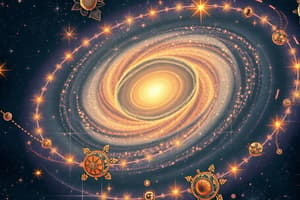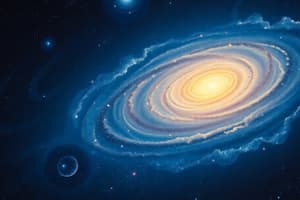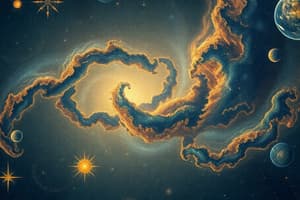Podcast
Questions and Answers
A collection of stars, interstellar gas, dust and remnants of stars that are all bound together by ______.
A collection of stars, interstellar gas, dust and remnants of stars that are all bound together by ______.
gravity
A galaxy shaped like an elongated sphere is called an ______ galaxy.
A galaxy shaped like an elongated sphere is called an ______ galaxy.
elliptical
Spiral galaxies contain a bulge, a disk and a ______.
Spiral galaxies contain a bulge, a disk and a ______.
halo
Irregular galaxies usually do not have a clearly defined shape and are often much ______ than spiral or elliptical galaxies.
Irregular galaxies usually do not have a clearly defined shape and are often much ______ than spiral or elliptical galaxies.
The formation of galaxies occurs as matter is attracted to other nearby matter due to ______.
The formation of galaxies occurs as matter is attracted to other nearby matter due to ______.
Flashcards
Spiral Galaxy
Spiral Galaxy
A galaxy with a bulge, disk, and halo, where stars are brightest near the center.
Elliptical Galaxy
Elliptical Galaxy
A galaxy shaped like an elongated sphere, with older stars.
Irregular Galaxy
Irregular Galaxy
A galaxy with no specific shape, often smaller and with deformed structures.
Galaxy components
Galaxy components
Signup and view all the flashcards
Galaxy Formation
Galaxy Formation
Signup and view all the flashcards
Study Notes
Galaxy Definition
- A galaxy is a collection of stars, interstellar gas, dust, and remnants of stars bound together by gravity.
Types of Galaxies
- Spiral Galaxy: A galaxy containing a bulge, a disk, and a halo. The stars are brightest near the center, and less so near the edges. Stars in spiral galaxies are typically younger.
- Elliptical Galaxy: Elongated sphere shaped galaxy, featuring a bright mass of stars, becoming less bright towards the outer edges. Generally contains older stars. Comes in a variety of sizes.
- Irregular Galaxy: Lacking a clearly defined shape; their structure is deformed due to uneven gravitational forces. Usually smaller than other types of galaxies. Shape changes could arise from collisions with other galaxies.
Galaxy Formation
- Gravity pulled nearby matter together, creating larger clumps.
- Gravity intensified, forming stars inside these clumps.
- Small star clusters filled the universe.
- These clusters interacted, merged, to form galaxies.
Studying That Suits You
Use AI to generate personalized quizzes and flashcards to suit your learning preferences.




